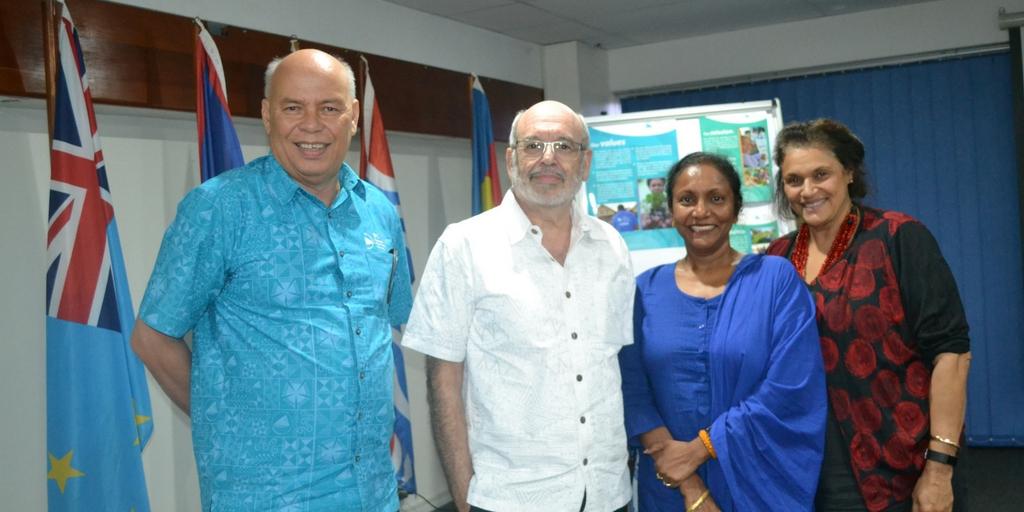The Pacific Community welcomed Professor Sir Peter Gluckman, Chief Science Advisor to the Prime Minister of New Zealand, to lead a workshop on science, social science, and the impact they can have on policy making and evaluation.
The workshop was held at the SPC’s campus in Suva, Fiji and was attended by the Pacific Community’s Director-General Dr Colin Tukuitonga; Deputy Director General, Dr Audrey Aumua; University of the South Pacific, Dean, Faculty of Science, Technology & Environment, Dr Anjeela Jokhan with USP representatives; as well as SPC staff from across the organization.
Held under the theme of ‘The Interface Between Evidence and Policy” the workshop explored the challenges faced by small island states in ensuring that policy development effectively addresses the specific needs of each state.
During the workshop Sir Peter Gluckman emphasised the impact of the Sustainable Development Goals (SDGs), on global development efforts and the opportunity that the SDGs provide to small island developing state policymakers to promote and adopt evidence based programs.
“Evidence does not make policy. But the ability to clearly and effectively communicate evidence can have an enormous impact on policy direction. Understanding evidence allows policymakers to make informed decisions, and informed decisions are ultimately better decisions,” Sir Peter Gluckman.
While setting the scene of the science and policy making sphere in the Pacific, Pacific Community’s Deputy Director General, Dr Audrey Aumua said, “We have a technical and a moral obligation to ensure that policymakers across the Pacific understand how the work we do is relevant to the policy making process. To do this effectively requires an integrated approach, in which the relationship between science and policy is established at the very start of the process.”
The Dean of the Faculty of Science, Technology & Environment at USP, Dr Anjeela Jokhan, giving an educational perspective at the workshop said, “We have a lot of involvement with education systems and schools throughout our region. SPC did a good job a few years back, when they looked at the literacy and numeracy of school children in the Pacific which showed the really low level of literacy and numeracy skills which are important for any movement forward.”
The second session of the workshop included group work in which two fictional case studies were focussed on to see how practice of science could improve policy and decision making in local communities.
Dr. Tukuitonga, speaking at the conclusion of the workshop, echoed Professor Gluckman’s thoughts on the clear communication of evidence’s ability to drive the direction of policy noting that “SPC has always been at the forefront of policy making in the region by providing scientific and observational evidences, through the work it does in in all its divisions, to its stakeholders.”
Improving the communication and coordination between the scientific community and the Pacific region’s policymakers will continue to be a priority for the Pacific Community, and a fundamental pillar for achieving the organizations strategic goals.
Background :
Professor Sir Peter Gluckman is the Chair of the International Network for Government Science Advice and Chief Science Advisor to the Prime Minister of New Zealand. He is founder and chair of both the APEC Economies’ Chief Scientists’ and Equivalents Network (CSAE) and the International Network of Government Science Advice (www.ingsa.org). He is the founding chair of the Small Advanced Economies Initiative (SAEI), which is an intergovernmental forum focused on science policy challenges unique to smaller jurisdictions. In 2015, Sir Peter was appointed chair of the WHO’s Commission to End Childhood Obesity. He is the 2016 recipient of the Science Diplomacy Award from the American Association for the Advancement of Science (AAAS).
Sir Peter was the founding Director of the Liggins Institute and is one of New Zealand’s best known scientists. In 2016, he won the Blake Award, the top honour at the Sir Peter Blake Leadership Awards. In 2015, he was invested to the Order of New Zealand, the country’s highest honour which is reserved for only 20 living people. Prior to this, Sir Peter became a Knight of the New Zealand Order of Merit in 2009 and a Distinguished Companion of the NZ Order of Merit in 2008. In 2001 he received New Zealand’s top science award, the Rutherford Medal.
Media contacts:
Vivien Eyre, email: [email protected]
